Participating Fellows
2017 Cohort
Stefano Barchiesi
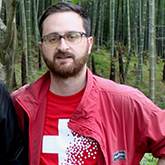
Advisor: Dr. Christine Angelini
School of Natural Resources and Environment
Stefano Barchiesi holds a Master’s degree in Natural Sciences from University of Bologna, Italy and an M.S. in Environmental Management and Policy from Lund University in Sweden. Stefano previously served on the Ramsar Convention’s Scientific & Technical Review Panel when he was with IUCN Global Water Programme in Switzerland for nine years. He has also done research for the European Union’s Development Cooperation on the Water-Energy-Food-Ecosystems Nexus. His research interests are wetland restoration, environmental flows, ecosystem services and socio-economics of natural infrastructure.
View Stephano’s Practicum Project: Wise Up! : Incorporating the Ramsar Convention’s “Wise Use” approach in the buffer of Palo Verde National Park and in the greater Tempisque watershed
Caroline Huguenin
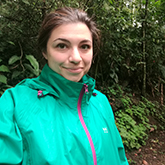
Advisor: Dr. Peter Waylen
Geography
Caroline Huguenin holds a Bachelor’s degree in Civil Engineering from University of Costa Rica and a Master’s degree in Water Science and Engineering from UNESCO-IHE in the Netherlands. Caroline previously served as an Advisory Board member at the Water Youth Network. Her Master’s thesis research focused on using the potential of thermal infrared remote sensing for source apportionment of river discharge and detection of groundwater occurrence in the Mara catchment. Her research interests include hydrology, remote sensing, climate-change scenarios, and working with youth on water issues.
View Caroline’s Practicum Project: What a Disaster:The effect of extreme events on governance and decision-making processes
Oswaldo Medina-Ramírez
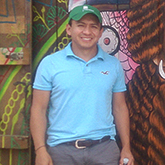
Advisor: Dr. Jeffrey Johnson
Anthropology
Oswaldo Medina-Ramírez earned his Bachelor’s degree in Socioeconomic Development and Environment from Zamorano University in Honduras, and a Master’s degree in Sustainable Development Practice from University of Florida with a specialization in governance and public policy. Oswaldo is a social scientist from Loja, Ecuador, and worked for six years in socioeconomic-related development issues in Ecuador and other Latin American countries with governmental and international organizations. His research interests include public policy, social network analysis, governance, agriculture, and multidimensional approaches to rural and urban socioeconomic development.
View Oswaldo’s Practicum Project: Mi Cuenca es tu Cuenca: A comparative Analysis of watershed-based governance within and outside Costa Rica
Marco Pazmiño-Hernandez
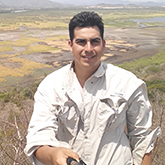
Advisor: Dr. Rafael Muñoz-Carpena
Agricultural and Biological Engineering
Marco Pazmiño-Hernandez’s dissertation research focuses on integration and implementation of agent-based modeling in the Tempisque-Bebedero watershed in Costa Rica. This makes him an important member to the Tempisque WIGF cohort, although he is not funded by a WIGF student Fellowship.
Marco is from Guayaquil, Ecuador, where he received a Bachelor’s degree in Business Administration from Escuela Superior Politecnica del Litoral. Marco received a Master’s degree from University of Florida with emphasis on biofuels and gasification. Marco also earned a minor in Environmental Science in water treatment. Marco’s research interests include surface-runoff modeling, global sensitivity and uncertainty analysis, agent-based modeling, water-quality management in coastal wetlands, and time-series analysis.
Pierre Sosnowski

Advisors: Dr. Rafael Muñoz-Carpena (University of Florida) and Dr. Mathieu Javaux (Catholic University of Louvain-la-Neuve in Belgium)
Agricultural and Biological Engineering Department – University of Florida
Department of Environmental Sciences of the Earth and Life Institute – Catholic University of Louvain-la-Neuve in Belgium
Pierre Sosnowski is a doctoral student co-advised by both Dr. Rafael Muñoz-Carpena at University of Florida’s Agricultural and Biological Engineering Department and Dr. Mathieu Javaux at Catholic University of Louvain-la-Neuve’s Department of Environmental Sciences of the Earth and Life Institute. Pierre holds Bachelor and Master degrees in Bioengineering from Catholic University of Louvain-la-Neuve in Belgium, specializing in management of soil and water resources. Pierre’s scientific interests focus on links between ecological integrity and hydrological regime of tropical environments, with emphasis on wetland systems such as the Palo Verde wetland in western Costa Rica.
Pierre’s PhD research aims to identify, quantify and model water fluxes and dominant processes controlling Palo Verde wetland’s hydrological partitioning, and develop and calculate a list of representative indicators to assess degree of wetland hydrological alteration and its potential link to ecological degradation. His research findings will help identify effective restoration and management programs for Palo Verde and other wetlands.
View Pierre’s Practicum Project: Can we please be flexible? Obstacles and opportunities for adaptive management of the Arenal-Tempisque wastershed
Kati Vazquez
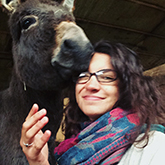
Advisor: Dr. Rachata Muneepeerakul
Agricultural and Biological Engineering
Kati Vazquez received her Bachelor’s degree and is completing a Master’s degree in the Agricultural and Biological Engineering Department at the University of Florida. As a Water Institute Graduate Fellow, Kati will model coupled human-natural systems in the Tempisque River watershed. Her research interests include links between hydrology and humans, tradeoffs in environmental policy, and water quantity and quality issues.
View Kati’s Practicum Project: Governing by Algorithm? Deploying quantitative and semi-quantitative socio-ecological modeling to inform and improve watershed management

